Education and Student Committee
CHAIR: Aurélie Carlier
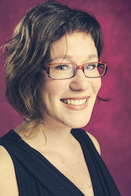
MERLN Institute for Technology-Inspired Regenerative Medicine
Maastricht University
Universiteitssingel 40, 6229 ER Maastricht – Room C3.577
The Netherlands
Email: education.chair@esbiomech.org
Aurélie Carlier is associate professor at the MERLN Institute in Maastricht, the Netherlands. She received her MSc in Biomedical Engineering in 2010 and her PhD degree in Biomedical Engineering in 2014, both at the KU Leuven, Belgium. During her PhD she also visited the Systems Biology Laboratory at the Johns Hopkins University in Baltimore, USA. Her research interests encompass the multiscale computational modelling of biological processes, with a particular focus on bone tissue engineering applications and cell-biomaterial interactions and using a range of data-driven to mechanistic modelling approaches. Aurélie Carlier is the author of more than 40 ISI indexed journal papers, 3 book chapters and over 90 full conference proceedings and abstracts. Her research achievements have been awarded with a number of distinctions, including the Student Award of the European Society of Biomechanics (ESB, 2012), the Reinhart Heinrich Doctoral Thesis Award by the European Society for Mathematical and Theoretical Biology (ESMTB, 2015) and the Best Doctoral Thesis Award by the European Society of Biomechanics (ESB, 2015). She has also been elected as member of theTissue Engineering Young Investigator Council (TEN YIC, 2016) and received a prestigious VENI career development grant (0.25 M€) from the Dutch Science Foundation. Besides her research, she is co-founder and vice-chair of FEM (Female Empowerment Maastricht University), a network to discuss and tackle gender issues.
Members:
Alessio Amicone
Laboratory for Orthopaedic Technology, Institute for Biomechanics, ETH Zürich, Switzerland
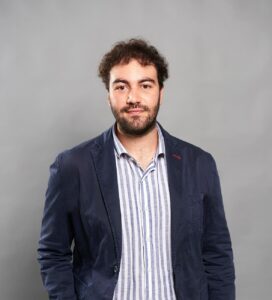
Alessio Amicone is currently a doctoral student at the Laboratory for Orthopaedic Technology at ETH Zurich, within the BioTrib project. He received his bachelor’s degree in Biomedical Engineering at the University of Bologna in 2017 (Italy) working on the mechanical characterization of multi-vertebrae spine segments. He then joined an Erasmus+ traineeship experience at the INSIGNEO Institute for in silico medicine in Sheffield (UK), working on the investigation of the morphological and densitometric properties of cortical bone of the human femur. When he developed a strong interest in the biomechanical and biomaterials branch of biomedicine, he decided to move to the Politecnico di Milano (Milan, Italy), where, in 2020, he got his MCs degree in Biomedical Engineering, majoring in Biomechanics and Biomaterials, with a research project on the computational analysis of the biomechanics of the tricuspid valve.
His research topic is now on the elucidation of friction-induced failure mechanisms in articular cartilage and, more generally, in fibrous collagenous tissues, by combining experimental tests with computer simulations of the fracture mechanisms of fibrous material. Alessio is a member of the European Society of Biomechanics (ESB) and is now very enthusiastic to be part of the ESB student committee and to contribute to the field he is deeply passionate about.
Chiara Dazzi
Computational Mechanobiology group, Julius Wolff Institute, Charité – Universitätsmedizin Berlin, Berlin, Germany
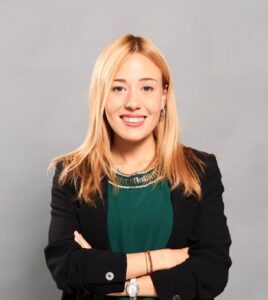
Chiara Dazzi received her bachelor degree in Biomedical Engineering from the University of Bologna (Italy) in 2017 working on the mechanical characterization of scaffolds for tendon regeneration. She continued her studies at Polytechnic of Milan (Italy) completing in 2020 a master of science in Biomedical Engineering with a research project on the computational analysis of the tricuspid valve biomechanics. During her studies, Chiara developed a profound interest in Computational Biology and Computational Biomechanics. Since March 2021, Chiara has been a PhD candidate at Julius Wolff Institute of Charité Universitaetsmedizin Berlin (Germany) where she is developing her research project within the Computational Mechanobiology group. In particular, by means of multi-scale in silico models, she aims at investigating the mechano-regulation and the mechano-biological interplay of sprouting angiogenesis during bone fracture healing.
Dr. Jorge Barrasa Fano
Mechanobiology and Tissue Engineering lab, KULeuven, Belgium
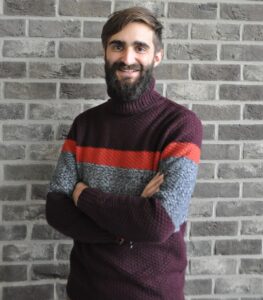
Jorge Barrasa Fano is a postdoctoral researcher at the Mechanobiology and Tissue Engineering lab lead by Prof. Van Oosterwyck at KU Leuven, Belgium. He received his MSc in Biomedical Engineering in 2017 and his PhD degree in Mechanical Engineering in 2022, both from KU Leuven. During his MSc he did a research stay at the Division of Gastroenterology, at Johns Hopkins University, in Baltimore, USA. During his PhD, he did a research stay at the University of Seville, Spain. In 2022, Jorge was awarded a 3-year postdoctoral fellowship by the Research Foundation Flanders (FWO), enabling him to participate in a collaborative project across laboratories in Belgium, France, the Netherlands, and Spain. His research focuses on microscopy image analysis and the development of experimental and computational tools to investigate cell-matrix mechanical interactions. Jorge has (co)authored 8 articles published in peer-reviewed journals. He has received several prestigious honors, including the Student Award of the European Society of Biomechanics (ESB, 2020), the Belgian National Committee of Theoretical and Applied Mechanics Award for the Best PhD Thesis (BNCTAM, 2022), and the Flemish Interuniversity Council PhD thesis thread competition (VLIR, 2022). In addition to his research, Jorge actively engages in science communication. He serves as the head of the Science Communication committee at the association of Spanish Scientists in Belgium (CEBE), where he organizes science dissemination events. Furthermore, he regularly contributes to a science section of a news podcast on Radioalma radio station.
Laura Lafuente Gracia
Biomechanics section, Department Mechanical Engineering, KULeuven, Belgium
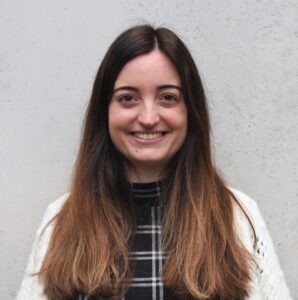
Laura Lafuente-Gracia graduated from the University of Zaragoza (Spain) with a Bachelor in Mathematics (2017) and a Master in Biomedical Engineering (2019). During her studies, she completed two stays abroad as an Erasmus student. For the first one, she went to the TU München in Germany and fell in love with the field of mathematical biology, which was reflected in her bachelor’s thesis “Mathematical study of the disease diffusion”. For the second stay abroad, she went to the KU Leuven in Belgium and wrote her master’s thesis “Where shall I go? The mechanosensing adventures of a computational single cell”. She is very enthusiastic about the field of biomedical engineering and therefore started a PhD in the group of Prof. Geris at the Biomechanics section of the KU Leuven. As PhD student, she investigates bone fracture healing with the help of computational models. She is also a member of Prometheus, the division of skeletal tissue engineering of KU Leuven, where she broadens her scope beyond the engineering perspective. With this idea in mind, she has joined the ESB Student Committee to further develop her insight into all facets of the biomedical field.
Dr. Gianluca Santesarti
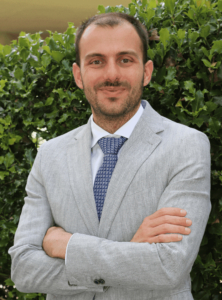
Department of Mechanical and Aerospace Engineering, Sapienza University of Rome, Italy
Gianluca Santesarti is a Research Fellow at Sapienza University of Rome on in-silico modelling of human bone at the nanoscale since March 2024. He obtained the PhD in Civil Engineering at the University of Rome Tor Vergata in July 2023, by discussing the thesis entitled “Modelling of extrusion-based bioprinting via quasi-analytical and FSI computational approaches”. His research topics are the fluid dynamics of Newtonian and non-Newtonian fluids, and the fluid-structure interaction (FSI), applied to the bioengineering field. In his PhD, he studied the dynamics of bio-ink flow during the extrusion-based bioprinting process, and the local interactions occurring between the polymeric hydrogel and the immersed cells forming the bio-ink, through analytical and FSI numerical approaches. In 2019, he received the MSc in Energy Engineering at the University of Bologna, with a thesis regarding multi-scale FSI problems analysed through Finite Element Method (FEM) simulations. Afterwards, he carried out an internship in a R&D department in the automotive sector, and then completed the state examination for the industrial engineering qualification. In 2016, he obtained the BSc in Energy Engineering at the University of Rome Tor Vergata, with an experimental thesis on cruise control for electric vehicles. Gianluca is a member of the European Society of Biomechanics (ESB), EUROMECH and Italian associations AIMETA, INdAM, SIMAI, and he is very enthusiastic to contribute to this ESB committee’s activities.
Dr. Aurélie Levillain
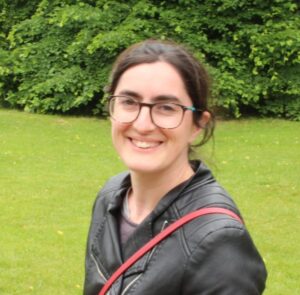
Laboratory of biomechanics and impact mechanics, Univ Lyon-Univ Eiffel, Lyon, France
Aurélie Levillain is an assistant professor (Maître de conférences) at Université Claude Bernard Lyon 1 (France), conducting her research at the laboratory of biomechanics and impact mechanics. After obtaining an engineering degree and a master degree in biomechanics from Ecole Centrale Lyon in 2013, she received her PhD degree in biomechanics in 2016. She then held two postdoctoral positions in the department of bioengineering at Imperial College London, before being awarded a Marie Sklodovska Curie fellowship in 2020 at Univ Lyon-Inserm. Her research interests include mechanical characterisation of biological tissue, finite element modelling for fracture prediction, and implant biomechanics. She is an author of 8 papers in international peer-reviewed journals and presented in international congresses, including the World Congress of Biomechanics in 2018 where she obtained an ESB travel award. She is also a reviewer for several journals in biomechanics.
Aurélie has been a member of the European Society of Biomechanics since 2016. She joined the scientific communication team led by Ilse Jonkers in 2022 and is very enthusiastic to be involved in the very diverse activities organised by the committee.
Dr. Sangita Swapnasrita
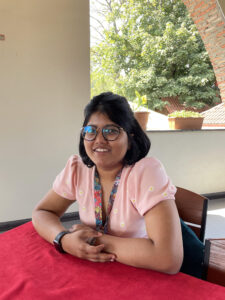
MERLN Institute for Technology-Inspired Regenerative Medicine, Maastricht University, the Netherlands
Sangita Swapnasrita is currently a postdoctoral researcher in the cell Biology-inspired Tissue Engineering department at Maastricht University where she is pursuing her research goal of developing sex-specific mathematical models of kidney and kidney replacement therapies. With a PhD from University of Bremen in making computational models of gas diffusion and adsorption in CO sensors, she switched fields to join the computational biology lab of Aurélie Carlier. She has recently obtained a Kolff+ grant to model a novel sorbent-assisted peritoneal device and will continue to work on personalisation of the treatment for dialysis patients. She is also a recipient of the MDR Young Talent Incentives award to look more at the sex-specific transport of solutes in kidney organoids with Prof. Anita Layton from University of Waterloo, Canada.
Sangita has been a member of the European Society of Biomechanics since 2021 and works for scientific communication. Together with Ilse Jonkers she organises the journal club and the PI interviews for ESB.
Dr. Andrada Pica
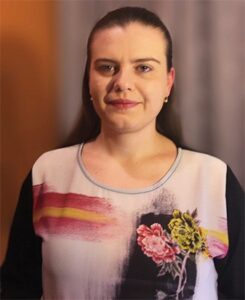
Research Group in Industrial Bioengineering at the Department of Mechanical and Aerospace Engineering, Sapienza University of Rome
Andrada Pica received the Bachelor’s Degree in Clinical Engineering in 2013 and the Master of Science Degree in Biomedical Engineering in 2016, both from Sapienza University of Rome, Italy. In July 2021, she obtained the Ph.D. degree in Industrial and Management Engineering from Sapienza University of Rome, discussing a thesis entitled “Hierarchical 3D models of the mineralized collagen fibrils”. She is currently a Research Fellow affiliated with the Research Group in Industrial Bioengineering at the Department of Mechanical and Aerospace Engineering, Sapienza University of Rome. The research interest concerns the characterization of bone tissue, linking its complex hierarchical structure to tissue properties in the context of physiological and pathological conditions. Her work is based on the development of 3D numerical and finite element models of bone at different length scales. A particular focus is attributed to the analysis of bone nano- and micro-structure in healthy and pathological conditions, as osteoarthritis. Andrada is also involved in scientific collaborations with national and international research groups. She is member of the European Society of Biomechanics (2021) and the Italian National Group of Bioengineering (2020).
Dr. Alexandra Tits
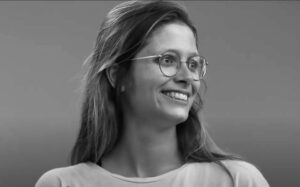
Mechanics of Biological and Biosinpired Materials laboratory, University of Liege, Liege, Belgium
Alexandra Tits is a PhD candidate from the University of Liege (Belgium), where she obtained a Master Degree in Biomedical Engineering in 2018. For her Master Thesis, she collaborated with the Auckland Bioengineering Institute (New-Zealand). During this research stay, she loved the interdisciplinary of her project and discovered a passion for biomechanics. In 2018, she received a grant from the Belgian National Fund for Scientific Research to carry on a PhD focusing on the morphological, material and mechanical investigation of the tendon-bone complex with multiple techniques. Her research involves many collaborations with national and international institutions including the Katholieke Universiteit Leuven (Belgium), the Ludwig Boltzmann Institute of Osteology (Vienna, Austria) and the Max Planck Institute of Colloids and Interfaces (Potsdam, Germany).
Alexandra is also active in several doctoral associations. She has been the communication manager and secretary for the PhD community of the University of Liege for two years and she is the organization manager of a collective vegetable garden project (the “Pot’Ingé”) aiming to raise awareness on ecological issues. Since 2021, she is involved in the National Youngster Committee for Biomedical Engineering, and she is now thrilled to be part of the ESB student committee!
Dr. Rajdeep Ghosh
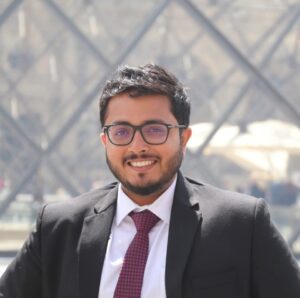
Department of Mechanical Engineering, University of Sheffield
Rajdeep Ghosh is a research associate in the Department of Mechanical Engineering at the University of Sheffield, UK. He is also associated with the Integrated Musculo Skeletal Biomechanics (IMSB) group at the Insigneo Institute. Presently, he is working with Professor Damien Lacroix and Professor Enrico Dall’Ara on the “ METASTRA ”, project that aims to transform fracture risk assessment in cancer patients with vertebral metastasis. He has completed his bachelors with a major in mechanical engineering from the National Institute of Technology Agartala, India (2011-2015) and a PhD (2017-2023) in bone biomechanics and computational mechanobiology from the Indian Institute of Technology Guwahati, India. During his PhD, he investigated the influence of implant textures on osseointegration followed by development of a neural network-genetic algorithm pipeline towards design optimization of those textures for better secondary stability of the implant. Thereafter, he joined Orthopaedic Biomechanics and Implant Design (OBID) group as a Postdoc (2022-2023) at the Indian Institute of Technology Delhi, India where he worked in the project “add-Bite” towards design and development of lattice-structured temporomandibular joint (TMJ) implants for Indian patients suffering from TMJ ankylosis. He is an author of 5 papers in international peer-reviewed journals, 2 book chapters and presented in several prestigious international congresses. He served as a reviewer for several international journals and research grants in the field of bone biomechanics, implant design and AI. He has been a member of the European Society of Biomechanics since 2023. Apart from that, he is also associated with Orthopaedic Research Society, International Society of Biomechanics and Institute of Engineers (India). His future research interests are primarily translational and interdisciplinary in nature focussing towards the areas at the intersection of machine learning, biomechanics and healthcare.
Dr. Anna Corti
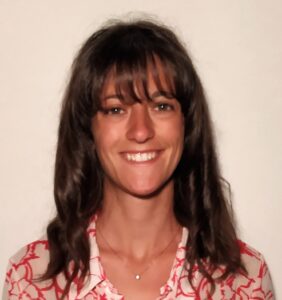
Department of Electronics, Information and Bioengineering of Politecnico di Milano, Italy
Anna Corti is a Post-Doctoral Researcher at the Dept. of Electronics, Information and Bioengineering of Politecnico di Milano (Italy). She obtained the PhD in Bioengineering at Politecnico di Milano in July 2022 with a thesis entitled “Multiscale modeling of vascular adaptation”. Before her current position, she worked as Post-Doctoral Researcher at Dept. of Chemistry, Materials and Chemical Engineering “G. Natta” of Politecnico di Milano until April 2023. During her doctoral studies, her research focused on the development of multiscale computational frameworks simulating vascular cell dynamics and arterial wall remodeling (e.g., atherosclerosis, restenosis) in response to mechanical and biological cues, through the integration of continuum and discrete modeling approaches. Currently, her research mainly focuses on image analysis, radiomics and artificial intelligence methods in cancer and cardiovascular research. Dr. Corti has authored several scientific papers on international peer-reviewed journals, book chapters, conference proceedings and contributions to national and international conferences. She presented her research national and international conferences with 4 invited talks, and several podium and poster presentations. She is also a Review Editor of Frontiers in Medical Technology, section Cardiovascular MedTech. Her research was awarded with numerous prestigious national and international awards, including the Best Master Thesis Award 2019 (ESB-ITA), Best VPHi Student Award 2020, Medtronic Travel Award 2020 (VPH 2020), CAE International Best Poster Award 2020, ANSYS Hall of Fame Top 10 Finalists for 2020, ESB Student Award 2021, Finalist of the ASME-BED/SB3C Student Paper Competition 2021, ESB Travel award 2022, ESB-ITA Best Poster Award 2022, Best Doctoral Thesis Award in Biomechanics 2023 (ESB), Best Doctoral Thesis in Theoretical and Applied Biomechanics (GBMA-AIMETA) and the VPHi Best Thesis Award in In Silico Medicine (VPHi).
Benedetta Fantaci
Applied Mechanics and Bioengineering (AMB), Instituto Universitario de Investigación en Ingeniería de Aragón, University of Zaragoza, Zaragoza, Spain
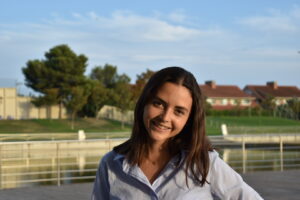
Benedetta Fantaci obtained her bachelor’s and master’s degrees in Biomedical Engineering at Polytechnic of Milan, where she worked on the implementation of an inverse elastostatic algorithm with exact linearization to determine the stress-free configuration of an artery as final master thesis’s project. During her master experience, Benedetta discovered her main interests in Finite-Element Modelling, Non-linear Solid Mechanics and Programming. Since September 2021, she has joined the OBERON project in the Marie Skłodowska-Curie actions framework (H2020 MSCA ITN) as PhD candidate at the University of Zaragoza (Spain). She is currently working on finite-element simulations of laser refractive surgery and their effects on corneal biomechanics. Benedetta is involved in multiple collaborations with different research groups in Europe and she is the tutor of some master’s thesis projects abroad. She is member of the European Society of Biomechanics since 2021 and she is thrilled to be part of the Student Committee!







